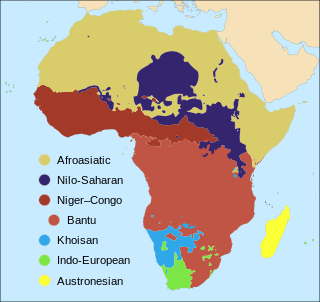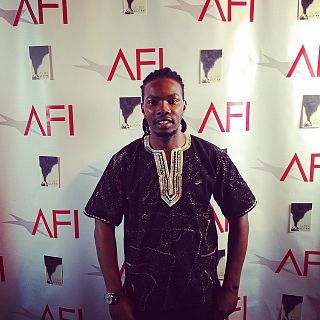Related Research Articles

Sub-Saharan Africa is, geographically, the area and regions of the continent of Africa that lie south of the Sahara. These include Central Africa, East Africa, Southern Africa, and West Africa. Geopolitically, in addition to the African countries and territories that are situated fully in that specified region, the term may also include polities that only have part of their territory located in that region, per the definition of the United Nations (UN). This is considered a non-standardized geographical region with the number of countries included varying from 46 to 48 depending on the organization describing the region. The African Union (AU) uses a different regional breakdown, recognizing all 55 member states on the continent - grouping them into 5 distinct and standard regions.

The languages of Africa are divided into several major language families:

East Africa, Eastern Africa, or East of Africa, is the eastern subregion of the African continent. In the United Nations Statistics Division scheme of geographic regions, 10-11-(16*) territories make up Eastern Africa:

In Uganda the most spoken local language is Luganda. The Baganda tribe occupies the southern central part of Uganda and the capital city of the country, followed by English, as all schools in Uganda use it in their studies due to the introduction of English during the colonial period. English is also the language of business and judicial matters. Most spoken after Luganda and English is Swahili. This language is more common in neighbouring Kenya and Tanzania. Swahili is taught in schools as an optional additional language and it is mostly spoken by the Ugandan army. In 2005, there were talks to include Swahili into as the second official language as it was seen as neutral, however this is still not ratified by the government.

The languages of the African Union are languages used by citizens within the member states of the African Union (AU). For languages of the institution, see African Union: Languages.

The Kingdom of the Banyakitara, also known as Union of Kitara(Union of Chwezi) or Chwezi Union and better known as the Kitara Empire, was an empire in East Africa. It existed in the great lakes region from around the early bronze age to about 500 C.E. During its growth under the mysterious Chwezi Kings., the (Empire of the sun, Empire of the moon) ruled much of the Nile valley and beyond during its peak., when the kingdom of Aksum disintegrated about 940 AD into the kingdoms of makuria, zagwe, Damot and Shewa., another kingdom split away in the south to form the great Empire of kitara., the empire encompassed of modern day Uganda, Eastern Kenya, eastern D.R. Congo, Rwanda, Burundi, Tanzania, Malawi, Zimbabwe and Zambia., the Google interface has been translated into Kitara in February 2010 by the Faculty of Computing and IT, Makerere University. It is also used in the Orumuri newspaper, published by New Vision Group.

The following outline is provided as an overview of and topical guide to Uganda:
Godfrey Mwene Kalimugogo was a novelist and diplomat from Uganda. He also served as a diplomat, representing Uganda in Tanzania and Ethiopia. He retired from the diplomatic service in 2003.
Rebecca Amuge Otengo is a Ugandan politician. As of 2017, she was appointed as Uganda's Ambassador to Ethiopia and Djibouti with residence in Addis Ababa. This position also makes her Uganda's Permanent Representative to the African Union (AU), Intergovernmental Authority on Development (IGAD) as well as UNECA She is the former State Minister for Northern Uganda in the Cabinet of Uganda. She was appointed to that position on 27 May 2011. Rebecca Amuge was an elected Member of Parliament as Alebtong District Women's Representative.

The culture of South Sudan encompasses the religions, languages, ethnic groups, foods, and other traditions of peoples of the modern state of South Sudan, as well as of the inhabitants of the historical regions of southern Sudan.

Samuel Kisakye Sejjaaka is a Ugandan accountant, academic and businessman. He is Principal and Country Team Leader at MAT ABACUS Business School. Between 1993 and 2014, he lectured at Uganda's oldest tertiary institution, Makerere University and rose to the position of Deputy Principal. In December 2014, he retired from the institution at age 50. He then helped establish Abacus Business School, Uganda's premier executive education institution. In 2019, Abacus Business school merged with the Management Accountancy Training Company (MAT) to form MAT ABACUS Business School.
Gabriel Ruhumbika is a Tanzanian novelist, short story writer, translator and academic. His first novel, Village in Uhuru, was published in 1969. He has written several subsequent novels in Swahili. He has also taught literature at a number of universities, and is currently a professor of Comparative Literature at the University of Georgia in the USA.
Christopher Henry Muwanga Barlow was a Ugandan poet, notable for his poem "Building the Nation". He was one of the recipients of the Uganda Golden Jubilee medals in 2013.
John Pancras Mukasa Lubowa Ssebuwufu, commonly known as John Ssebuwufu is a Ugandan chemist, academic and administrator. He is a former chancellor of Kyambogo University, Uganda's second-largest public university serving between 2014-2022 having served for 2 terms. He was installed as chancellor on 19 February 2014, replacing Eric Tiyo Adriko, who had completed his two term tenure. The correct spelling of his last name is Ssebuwufu. However the literature contains many instances where the name is spelled with a single "s".

GNL Zamba, born Ernest Nsimbi, is a hip hop artist in Uganda, credited with bringing rap and Lugaflow style of music to mainstream radio and other media in Uganda.
Austin Bukenya is a Ugandan poet, playwright, novelist and academic administrator. He is the author of the novel The People's Bachelor, and a play, The Bride. He has taught languages, literature and drama at Makerere University in Uganda and universities in the UK, Tanzania and Kenya since the late 1960s. He has also held residences at universities in Rwanda and Germany. Bukenya is also a literary critic, novelist, poet and dramatist. An accomplished stage and screen actor, he was for several years Director of the Creative and Performing Arts Centre at Kenyatta University, Nairobi.
Patrick Mangeni Wa’Ndeda a Ugandan writer, poet and playwright. He is the author of two plays, Operation Mulungusi, and The Prince, and a children's novel, The Great Temptation.
Dominica or Dominic Dipio is a Ugandan religious sister, a filmmaker, author and a professor of Literature and Film at Makerere University in Kampala, Uganda. As a sister, she belongs to the Institute of the Missionary Sisters of Mary Mother of the Church, MSMMC, a Ugandan-founded religious congregation in Roman Catholic Diocese of Lira in Northern Uganda. In November 2019 she was appointed Consultor of the Pontifical Council for Culture by Pope Francis.
References
- ↑ "Writers are mirrors of society, says Prof Arthur Gakwandi" observer.ug. Retrieved December 3, 2014.
- ↑ "Kosiya Kifefe (by Arthur Gakwandi)" africabookclub.com. Retrieved December 3, 2014.
- ↑ "Uganda: Kosiya Kifefe Guide Launched" allafrica.com. Retrieved December 3, 2014.
- ↑ "BOOKS THEY READ: Prof Arthur Gakwandi " monitor.co.ug.Retrieved December 3, 2014.
- ↑ "The Commonwealth Writers’ Prize 2008 " Archived April 23, 2013, at the Wayback Machine peepaltreepress.com. Retrieved December 3, 2014.
- ↑ nevender (2017-02-13). "Who Are The Male Heroes of Ugandan Literature?". Writivism. Retrieved 2021-04-04.
- ↑ Simon Gikandi, Evan Mwangi (Aug 13, 2013). The Columbia Guide to East African Literature in English Since 1945. Columbia University Press. ISBN 9780231500647 . Retrieved 3 December 2014.
- ↑ Nesther Nachafiya, Alu (July 2011). "Between New Challenges in African Literature and Contemporary Realities: the Case Study of Opanachi's Eaters of the Living". African Research Review. 5 (4) (21): 342–353. ISSN 2070-0083.
- ↑ Martin, Guy (2012). Pan-Africanism and African unity. Routledge Handbooks Online. ISBN 9780367030667.
- ↑ Falola, Toyin (2004). Nationalism and African Intellectuals. University Rochester Press. ISBN 978-1-58046-149-8.